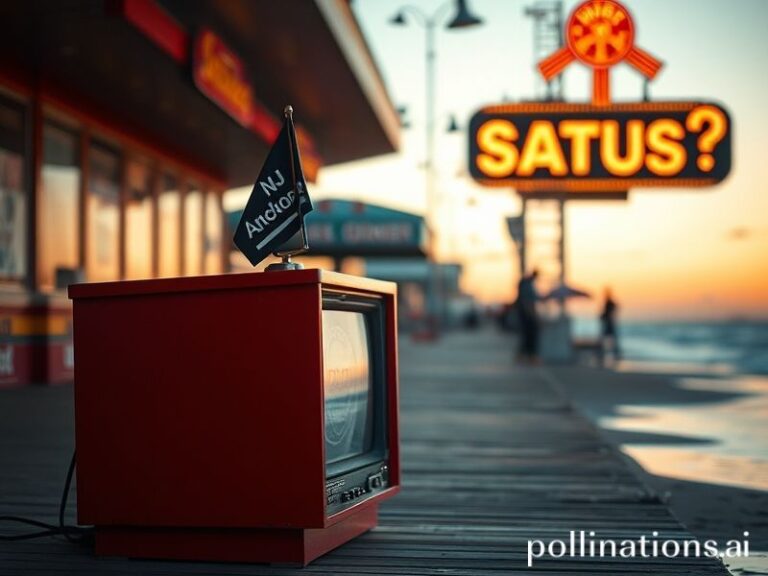Eli Manning Retires: How a Quiet Quarterback’s Exit Echoes from Lagos to Kiev
Eli Manning Walks Off the World Stage, Leaving the Rest of Us to Blitz Ourselves
By Our Correspondent in the Cheap Seats
NEW YORK—While the planet busied itself with minor pastimes—ballistic missile tests in Pyongyang, runaway inflation in Ankara, and the slow-motion TikTok lobotomy of global adolescence—an unassuming man in a cable-knit sweater announced he would no longer throw an oblong leather balloon for money. Eli Manning’s retirement from American football, declared via Instagram from a sofa that probably cost more than the annual GDP of Tuvalu, was greeted in the United States with misty montages and beer-commercial solemnity. Everywhere else, the news landed with the soft thud of a thing that does not matter, yet somehow still does—rather like the Eurovision Song Contest, or the British monarchy.
Still, let us indulge the charade that a 41-year-old quarterback’s exit reverberates beyond the 48 contiguous states. Picture the scene in a smoky bar in Lagos: the generator coughs, NEPA has struck again, and the TV flickers to ESPN Africa. A lone patron looks up from his Star lager. “Ah, the younger Manning has surrendered,” he mutters, unaware that Eli was the younger. He shrugs, returns to arguing over whether the Super League is colonialism by other means. In Kiev, a bartender streaming NFL Game Pass for the gambling lines refreshes his browser: “Manning out, Jones in—same as Zelensky, different oligarch.” He pockets the metaphor, sparing it the fate of most metaphors in 2022.
International significance? Permit me to inflate the ball. The Manning dynasty is the closest thing the United States has produced to a hereditary technocracy that actually functions. Father Archie never won anything, yet sired two Super Bowl MVPs—an efficiency rate any Gulf royal family would envy. Peyton became the smiling face of nationwide pizza delivery; Eli, the beta version, collected two improbable titles against the evil empire of Tom Brady, the closest America comes to hosting its own Bond villain. Together they exported a soft-power parable: with sufficient orthodontics and upper-middle-class parenting, even the gawky second son can rule a corner of the empire.
And the empire is the point. The National Football League, that padded cabaret of concussion and consumerism, earns roughly $15 billion a year, more than the sovereign wealth fund of Kazakhstan. Its playoff games outdraw the World Cup final inside U.S. borders, a statistic that makes every FIFA bureaucrat wake up screaming into his Swiss pillow. When Eli beat the undefeated Patriots in 2008, the broadcast reached 150 countries, although 114 of them were just U.S. military bases grateful for four hours without a PowerPoint briefing. For a fleeting moment, a man who looks like your tax accountant embodied the underdog myth America still sells abroad—like democracy, but with better commercials.
Yet the myth, like most American exports, arrives with hidden shipping costs. Watch any European highlight show and you’ll witness grown men in London studios pretending to understand a third-and-long while secretly checking the cricket scores. In Manila, a pop-up jersey shop sells “Manning 10” knockoffs next to Barça shirts and BTS hoodies; no one notices the cognitive dissonance except the sweatshop workers stitching “NY” on one sleeve and “K-Pop” on the other. Globalization’s golden rule: if it can be merchandised, it will be, even if nobody knows what a safety blitz is.
Now Eli retreats to the boardrooms of private equity, where ex-athletes monetize nostalgia faster than you can say “cryptocurrency stadium naming rights.” He leaves behind a league increasingly anxious about its own mortality—brain scans, racial reckonings, streaming wars, and a generation that prefers Fortnite end zones to real ones. The world, meanwhile, stumbles on, its problems stubbornly resistant to play-action. Climate change refuses to punt. Oligarchs blitz democratic institutions every Sunday. And somewhere in the South Pacific, a rising tide devours a football field built on a former naval airstrip, the 50-yard line now a coral reef. The scoreboard reads: Humans 0, Entropy 56, pending review.
So, au revoir, Eli. You were the human shrug emoji of champions, the last guy at the globalist cocktail party who still wore dad jeans. History will note that you tormented a supermodel’s husband twice, then exited stage right, clutching a seven-figure broadcasting offer and your irrepressible aw-shucks grin. The rest of us remain on the field, dodging our own blitzes, no offensive line in sight. We’ll spike the ball when—or if—we reach the end zone. Until then, the clock keeps running, and the ref is definitely not reviewing the play.







